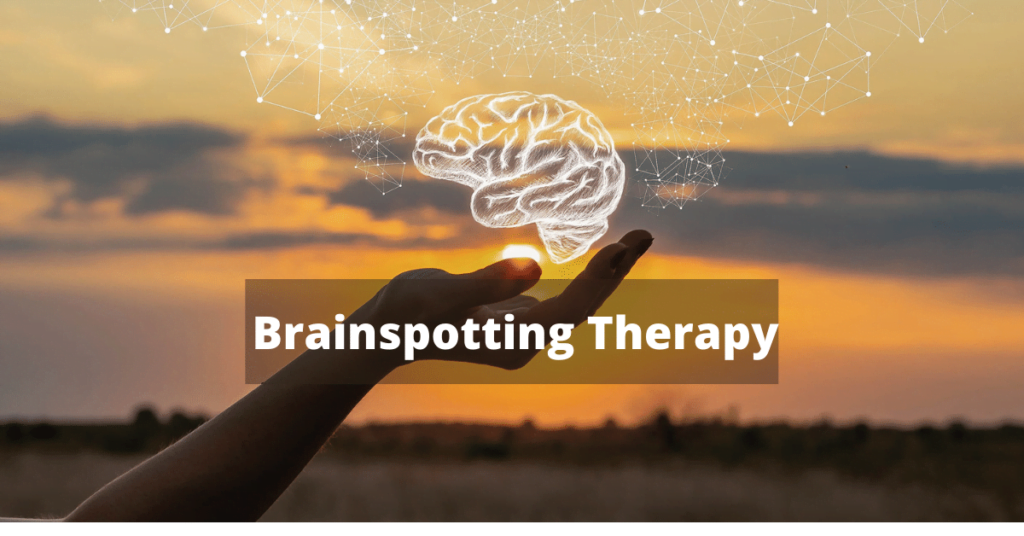Brainspotting therapy is a form of mental health treatment that uses guided imagery to address traumatic memories. The therapist guides the person through a series of exercises and visualization techniques in order to process unresolved trauma and come to terms with past events.
Contents
- 1 What Is Brainspotting Therapy?
- 2 Who Should Consider This Therapy?
- 3 How Does Brainspotting Work?
- 4 Benefits Of Brainspotting Therapy
- 5 Limitations Of Brainspotting Therapy
- 6 Who Provides Brainspotting Therapy?
- 7 Things to Know before Considering Brainspotting Therapy
- 8 Activities For Brainspotting Therapy
- 9 Conclusion
What Is Brainspotting Therapy?
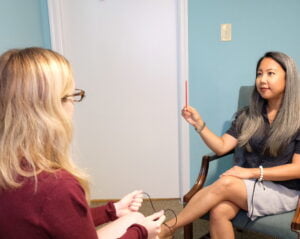 The technique was developed in the 1990s by Dr. John E. Sarno and his colleagues at New York University Medical Center and is now used worldwide in medical settings and in private practice by psychologists, psychiatrists, social workers, psychoanalysts, counselors, massage therapists, pain management specialists, and other healthcare professionals.
The technique was developed in the 1990s by Dr. John E. Sarno and his colleagues at New York University Medical Center and is now used worldwide in medical settings and in private practice by psychologists, psychiatrists, social workers, psychoanalysts, counselors, massage therapists, pain management specialists, and other healthcare professionals.
For those who have experienced trauma, the experience stays with them. These memories can be so powerful that they manifest as physical symptoms. In some cases, the body may develop a chronic ailment or pain in response to an emotional event from the past. The person will often need to visit a doctor and undergo medical tests before being told it is all in their head – when it’s not! With brainspotting therapy, you can help guide your patients through this process of healing and recovery.
Brainspotting therapy is a unique and powerful mental health treatment. It offers a way for individuals to address unresolved trauma and come to terms with their painful memories. Mind-body issues can affect people physically, creating both pain and illness in the body. Brainspotting therapy is a form of guided imagery that addresses these emotional wounds using a series of exercises and visualization techniques.
Who Should Consider This Therapy?
Anyone who has experienced trauma can benefit from Brainspotting. The mind and the body are so closely linked that unresolved emotions can bring about physical symptoms of chronic pain. This may lead people to visit their doctor for numerous tests before finally being told it’s all in their heads. Brainspotting therapy can help people address these issues, allowing them to heal and recover.
Brainspotting therapy is also beneficial for sufferers of anxiety and depression, as it can help to address the root of these problems. Finally, brainspotting therapy is a very short-term treatment; most people achieve relief from symptoms after just a few sessions.
There are many reasons why people might want to try Brainspotting therapy. It can be extremely helpful for those who have experienced trauma and who have not been able to come to terms with the past. For example, individuals who have experienced loss or abuse may not be able to function effectively in their daily lives without the support. As well, chronic pain and illness can take a toll on individuals’ lives, leaving them feeling frustrated and exhausted.
This treatment can be helpful for those who have not been able to find relief from their symptoms elsewhere. It is a low-risk, alternative form of mental health care that can be completed in as few as five sessions.
How Does Brainspotting Work?
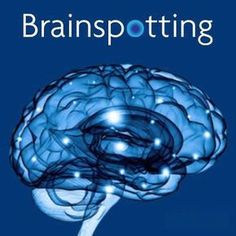 Brainspotting is a form of mental health treatment that uses guided imagery to work through unresolved trauma. People are guided through exercises and visualization techniques to process their memories in order to achieve relief from pain or illness.
Brainspotting is a form of mental health treatment that uses guided imagery to work through unresolved trauma. People are guided through exercises and visualization techniques to process their memories in order to achieve relief from pain or illness.
The therapist helps the person to access the memories that are causing them pain and to work through them in a safe and healthy way.
If you are looking for an effective and unique form of mental health treatment. Then Brainspotting may be the right choice for you. This therapy can help people to address unresolved trauma and pain, and to begin the process of healing. Contact your nearest mental health professional to find out more about this treatment.
Benefits Of Brainspotting Therapy
There are many benefits to brainspotting therapy, including reducing or eliminating physical pain and illness in the body, overcoming emotional difficulties such as depression, anxiety, addiction, and PTSD; improving relationships; increasing self-confidence; deepening spiritual awareness, and achieving a sense of inner peace that transcends time and space.

- Overcoming emotional difficulties-Brainspotting therapy is very effective in overcoming emotional difficulties such as depression, anxiety, addiction, and PTSD.
- Reducing or eliminating physical pain and illness-Another one of the many benefits of brainspotting therapy is that it can reduce or eliminate physical pain and illness in the body.
- Improving relationships-As brainspotting therapy helps people to become more emotionally healthy, it often has a positive effect on their relationships with others.
- Increasing self-confidence-Many people who undergo brainspotting therapy find that their self-confidence increases as a result.
- Deepening spiritual awareness-This form of therapy can also help people to deepen their spiritual awareness. This may lead to a sense of inner peace that transcends time and space.
- Losing the fear of death-This form of therapy also helps people overcome their fear of death, which can greatly improve their quality of life.
- Solving the great mystery-Finally, brainspotting therapy offers people an opportunity to solve the great mystery of life and death. This can be a profound experience that leads to a deeper understanding of oneself and the universe.
Low-risk
The human brain is an amazing organ that is capable of healing and recovering from trauma. Brainspotting therapy is a way to help those who have experienced traumatic events in the past, or who are dealing with chronic pain or illness that they cannot seem to recover from. This treatment is a low-risk, alternative method of mental health care that can be helpful for those who have not been able to find relief elsewhere. Brainspotting therapy offers a way for people to address unresolved trauma and experience relief from their memories.
Short-term Treatment
Brainspotting therapy is a short-term treatment that one can complete in as little as five sessions, making it a very accessible form of mental health care. It is also less expensive than other treatments such as psychotherapy. Finally, this treatment has been proven effective for those who have experienced trauma, anxiety, depression, and chronic pain or illness.
Improves Quality Of Life

Brainspotting therapy is a powerful form of treatment that can offer hope and relief to those who have experienced trauma and pain. It is a unique form of treatment that can help people to begin the healing process and improve their quality of life.
While brainspotting therapy is not a cure-all, it has been shown to be an extremely effective treatment for a variety of issues including emotional difficulties, physical pain and illness, and unresolved trauma.
If you are considering this treatment, please contact your nearest mental health professional to find out more. They will be able to answer any questions you may have and can help you get started on this powerful form of therapy. Remember that brainspotting therapy can offer hope and relief to those who have experienced trauma and pain. It is a unique form of treatment that can help people to begin the healing process and improve their quality of life. Thank you for reading.
Limitations Of Brainspotting Therapy

Brainspotting therapy is a powerful form of treatment. That can offer hope and relief to those who have experienced trauma and pain. It is a unique form of treatment that can help people to begin the healing process and improve their quality of life. However, there are some limitations to this form of therapy.
New Form Of Treatment
One of the main limitations of brainspotting therapy is that it is a relatively new form of treatment. As a result, there is not a lot of research available on its efficacy. Additionally, brainspotting therapy is not a cure-all and may not be effective for everyone. It is important to consult with a mental health professional before beginning this treatment in order to determine if it is right for you.
Not Helpful In Severe Trauma
Another limitation of brainspotting therapy is that it may not be helpful for those who have experienced severe trauma. Such as near-death experiences, abuse at the hand of a caregiver, or extreme neglect. A mental health professional will help you determine if this form of treatment can be beneficial to you. And inform you of any limitations based on your unique situation.
Finally, brainspotting therapy may not be available in some parts of the world. It is important to consult with a mental health professional to find out if this form of treatment is available near you before beginning your search. If it is not, they will help you determine other options that may be more effective for you.
Brainspotting therapy is a powerful form of treatment that can offer hope and relief to those who have experienced trauma and pain. It is a unique form of treatment that can help people to begin the healing process and improve their quality of life.
If you are considering this treatment, please contact your nearest mental health professional to find out more. They will be able to answer any questions you may have and help you get started on this powerful form of therapy.
Who Provides Brainspotting Therapy?
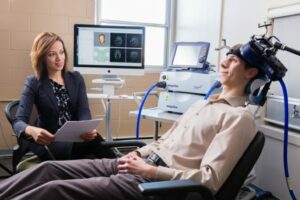
Therapists who specialize in brainspotting therapy are able to work with you to find out if this form of treatment is appropriate for you. It is important to determine what limitations, if any, exist in your situation before beginning this form of therapy.
If you are uncomfortable with discussing your situation with a therapist. You can also look for books or online resources that address brainspotting therapy. Remember that it is important to research any treatment before beginning in order to ensure that it is right for you.
Brainspotting therapy is a relatively new form of therapy effective in helping people to resolve their traumatic memories and experiences. This treatment can help those who have not been able to find relief from their symptoms elsewhere. It is a low-risk, alternative form of mental health care that can be completed in as few as five sessions.
Things to Know before Considering Brainspotting Therapy
If you are considering brainspotting therapy, there are a few things to keep in mind.
- First, this form of treatment is relatively new and there is not a lot of research on its efficacy.
- Secondly, this treatment may not be appropriate for someone who has experienced severe trauma. Your mental health professional will help you determine if it can be beneficial for you.
- Finally, this form of treatment may not be available near you. So it is important to consult with one before beginning the search.
If you are considering this treatment, please contact your mental health professional to find out more. As they will be able to answer any questions you may have and help you take this powerful form of therapy.
Activities For Brainspotting Therapy
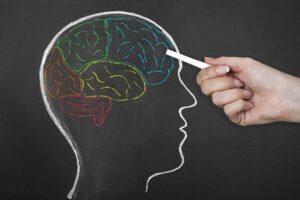 Brainspotting therapy is not the only way to resolve trauma and achieve mental health. Some activities that can be helpful include exercise, mindfulness meditation, guided imagery, art therapy, and journaling. One can perform these activities on their own or in the company of mental health professional. If you would like to schedule an appointment with one. Please contact your local mental health center for more information.
Brainspotting therapy is not the only way to resolve trauma and achieve mental health. Some activities that can be helpful include exercise, mindfulness meditation, guided imagery, art therapy, and journaling. One can perform these activities on their own or in the company of mental health professional. If you would like to schedule an appointment with one. Please contact your local mental health center for more information.
These are some great activities for brain potting therapy: -Playing games like chess, checkers, Sudoku, etc.;-Solving puzzles like Rubik’s Cube;-Taking part in intellectual debates with friends;-Building models or other objects out of LEGO blocks;-Doing origami (folding paper into shapes). Brain potting therapy is important. Because it helps us continue learning new things so we don’t stagnate intellectually. It also allows us to take a step back from the problems of our everyday lives and solve them in a more objective manner. So, the next time you have a bad day, try one of these activities. You may be surprised at how effective they can be.
A study reveals that nearly three-quarters of people who experience trauma and the resulting brain damage are unaware they even had a problem. Typically, these individuals continue to experience emotional problems such as anxiety and depression without understanding why those feelings persist. But brainspotting therapy offers new hope for those suffering from past traumas and pain.
This relatively new form of therapy is based on the idea that certain memories stay present in specific parts of the brain. When triggered, these memories can cause intense emotional reactions such as anxiety, anger, and depression.
Brainspotting therapy helps people to resolve these traumatic memories by locating and targeting the specific memory or experience that is causing them emotional distress.
Brainspotting is a relatively new form of treatment. That is very effective in resolving traumatic memories and promoting mental health. We hope this article helps you understand the key aspects of brainspotting therapy. Including how it works and what you can expect from this type of treatment.
Conclusion
One of the best ways to recover from a bad day is to take your mind off it by engaging in an activity that stimulates creativity and problem-solving. This act of breaking down something complex into its individual components can be very therapeutic. Especially when you’re not trying too hard or feeling pressured. So, the next time you find yourself struggling, try one of these activities. And you may be surprised at how effective they can be.
If you are looking for affordable Online Counseling MantraCare can help: Book a trial therapy session
